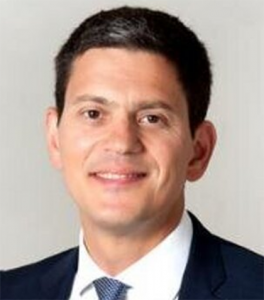Time to rethink the Refugee Convention
Former UK Foreign Secretary and leading humanitarian David Miliband has called for a rethinking of the 1951 Refugee Convention to better reflect the reality of human displacement in the 21st Century.
Writing in Newsweek magazine, Mr Miliband said the US and EU needed coordinate their leadership of the resettlement and protection of refugee and displaced persons around the globe while encouraging other wealthy nations to resettle refugee.
 And he said the US and EU should also support other refugee-hosting states while also moving from the short-term, year-to-year provision of aid to a more forward-looking approach.
And he said the US and EU should also support other refugee-hosting states while also moving from the short-term, year-to-year provision of aid to a more forward-looking approach.
“To truly refocus on the central tenets of the convention, the US and EU should work in lockstep on the global stage to coordinate their resettlement efforts to maximize protection, strengthen the global protection infrastructure and inspire a growing, diverse number of countries to participate in resettlement efforts. Those with the greatest resources should exercise the greatest responsibility,” wrote Mr Miliband, who is also CEO of US-based NGO the International Rescue Committee.
“Most directly, EU member states should resettle 250,000 refugees by the end of 2025, starting with pledging at least 36,000 places in 2022. The U.S. should not only unlock funding to meet its current refugee admissions goal this year but should also double the cap for next year,” he said.
“Both the US and EU should urge other wealthy nations to start or scale up their resettlement programs, spreading the load so more countries participate.
“They should also cooperate and engage proactively with the organizations and coordinating bodies responsible for resettlement operations to ensure that key actors have adequate funding, support and information to meet rising resettlement needs,” Mr Miliband said.
He also called for a shared, long-term approach to solving the refugee crisis.
“… resettlement is not the only answer. The US and EU should also support refugee-hosting states. The need for greater responsibility-sharing to better protect refugees, create durable solutions and support host communities is increasingly urgent,” Mr Miliband said.
“Recent trends in conflict and forced displacement require a shift from year-to-year provision of aid to support basic needs to a more forward-looking approach that includes diplomacy and incentives to allow refugees to thrive together with host communities.
“The US and EU should provide more and better quality funding for protracted displacement situations, including by increasing multi-year, flexible financing to implementing partners and host governments. For refugees to thrive in host countries, the US and EU must incentivize host government policy reforms that secure rights for refugees to work, access regular social services and contribute to their host communities,” he said.
Mr Miliband was writing on the seventieth anniversary of the Refugee Convention, signed by 145 countries in the wake of WWII and which obligates states to standards of treatment and protection of asylum seekers and refugees.
But he said the nature and needs of refugees and asylum seekers have changed a lot since then and that displacement had become an increasingly long term phenomena.
“The history is that most refugees came from wars between states. But today’s refugees are the consequence of conflicts within states. Refugees are now displaced an average of 20 years, longer than ever before, and less than one per cent of refugees are ever resettled,” Mr Miliband said.
“They displace multiple times internally before moving across borders, and 60 per cent live in urban areas. They face limited economic opportunities, and women and girls face the all too common danger of gender-based violence—now a major claim for refugee status,” said.
“In stark contrast to when the convention was signed, at the end of 2020, there were 82.4 million individuals forcibly displaced worldwide as a result of persecution, conflict, violence and human rights violations—30.3 million were refugees, displaced across borders.
“The triple threat of conflict, the COVID-19 pandemic and the devastating impacts of climate change have all contributed to this unprecedented situation—from Syria, to Venezuela, to across the Sahel, Yemen and Afghanistan.
“In fact, Syria’s decade-plus war has produced the largest displaced population worldwide. In Afghanistan, a deadly mix of natural disasters and one of the world’s worst conflicts have displaced 2.6 million people, the third largest displaced group worldwide. And in Yemen, a severe humanitarian crisis has internally displaced over 4 million people,” Mr Miliband said.
He said rising global displacement had intersected with a declining international consenus on the convention.
“Over the past several years, we have seen a decline in resettlement and a hardening of asylum policies across the regions that once most firmly upheld these protections,” Mr Miliband said.
“The number of countries receiving resettled refugees worldwide fell from 34 countries in 2017 to merely 21 countries in 2020. And the countries receiving these refugees? Nearly 90 per cent are in low-or middle-income countries.
“Many of these countries are managing pre-existing civil unrest and violence, which has only been deepened by the pandemic, further diminishing capacity to provide refuge to those who are already vulnerable,” he said.












